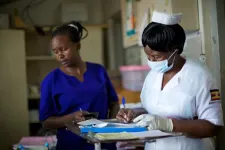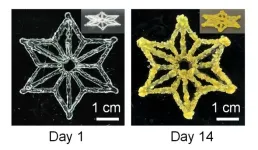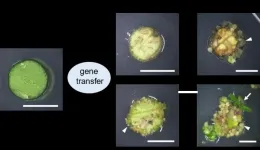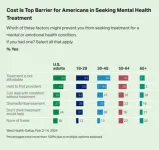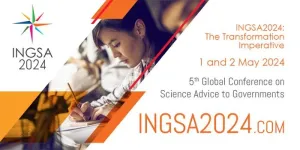(Press-News.org) NAIROBI, KENYA [May 1, 2024] — Local and global experts are meeting in Nairobi, Kenya to update clinical practice guidelines as part of ongoing work with Allied Against Cancer—a collaboration between the National Comprehensive Cancer Network® (NCCN®), African Cancer Coalition (ACC), American Cancer Society (ACS), and Clinton Health Access Initiative (CHAI). The meeting brings together subject matter experts to update NCCN Harmonized Guidelines™ for Sub-Saharan Africa, featuring updates for treating cancer in people with HIV and other important topics. The event runs from May 1-3, 2024.
NCCN Harmonized Guidelines™ for Sub-Saharan Africa are available free-of-charge at NCCN.org/harmonized or via the Virtual Library of NCCN Guidelines® App.
“Published guidelines have a direct impact on improving cancer treatment for people living with HIV by alleviating fears of drug interactions and confirming the safety and necessity of commonly used therapies,” said Warren Phipps, MD, MPH; Medical Director, Uganda Cancer Institute – Fred Hutch Collaboration. “Many cancers occur more frequently in people with HIV and AIDS, including AIDS-defining cancers like non-Hodgkin lymphoma, Kaposi sarcoma, and invasive cervical cancer. Non-AIDS defining cancers are also on the rise in this population as AIDS treatment improves, leading to longer life expectancies. Sub-Saharan Africa is disproportionately burdened by HIV/AIDS, making these region-specific guidelines particularly necessary.”
The NCCN Harmonized Guidelines™ employ color-coded recommendations to delineate the best possible cancer care across various settings and resource availability. They are based on the NCCN Clinical Practice Guidelines in Oncology (NCCN Guidelines®)—evidence based expert consensus recommendations maintained by multidisciplinary panels of leading clinicians and researchers. Allied Against Cancer is committed to updating these tailored guidelines at least every other year, meeting with local oncologists in Sub-Saharan Africa to share expertise and experience.
“These meetings give us unique and productive opportunities for knowledge sharing across different countries and specialties,” said Shanthi Sivendran MD, MSCR, MBA, Senior Vice President for Cancer Care Support, American Cancer Society. “By standardizing treatment approaches based on the latest evidence, we can help make sure that patients are receiving optimal care. These guidelines also provide a blueprint for how best to scale up capacity in resource-constrained areas.”
The Nairobi meeting will focus on updates to the NCCN Harmonized Guidelines™ for People Living with HIV, as well as the following cancer types:
Breast Cancer
Kaposi Sarcoma
Malignant Pleural Mesothelioma
Non-Small Cell Lung Cancer
Occult Primary (Cancer of Unknown Primary)
Prostate Cancer
Small Cell Lung Cancer
Thymomas and Thymic Carcinomas
The group will also update NCCN Harmonized Guidelines™ focused on prevention and supportive care, including:
Breast Cancer Screening and Diagnosis
Prevention and Treatment of Cancer-Related Infections
Prostate Cancer Early Detection
William J. Gradishar, MD, Robert H. Lurie Comprehensive Cancer Center of Northwestern University, Chair of the NCCN Guidelines Panel for Breast Cancer is participating in the meeting, along with Gregory J. Riely, MD, PhD, Memorial Sloan Kettering Cancer Center, Chair of the NCCN Guidelines Panel for Non-Small Cell Lung Cancer/Mesothelioma/Thymomas and Thymic Carcinomas Panel and Manoj P. Menon, MD, MPH, Fred Hutch Cancer Center, who is a Member of the NCCN Guidelines Panels for Cancer in People with HIV and Kaposi Sarcoma.
“The NCCN Harmonized Guidelines exemplify our commitment to advancing cancer care and reducing global disparities in cancer-related access and outcomes,” said Crystal S. Denlinger, MD, Chief Executive Officer, NCCN. “We hope their ongoing use and implementation leads to tangible, continuous improvements for cancer prevention and treatment across Sub-Saharan Africa and contributes to better health outcomes for individuals throughout the region.
NCCN Harmonized Guidelines™ for Sub-Saharan Africa have been endorsed by the Federal Ministries of Health and leading cancer centers in Ethiopia, Liberia, Malawi, Nigeria, Tanzania, Uganda, and Zambia, representing 44% of the population of Sub-Saharan Africa. Learn more about Allied Against Cancer’s efforts to improve cancer outcomes at alliedagainstcancer.org.
# # #
About the National Comprehensive Cancer Network
The National Comprehensive Cancer Network® (NCCN®) is a not-for-profit alliance of leading cancer centers devoted to patient care, research, and education. NCCN is dedicated to improving and facilitating quality, effective, equitable, and accessible cancer care so all patients can live better lives. The NCCN Clinical Practice Guidelines in Oncology (NCCN Guidelines®) provide transparent, evidence-based, expert consensus recommendations for cancer treatment, prevention, and supportive services; they are the recognized standard for clinical direction and policy in cancer management and the most thorough and frequently-updated clinical practice guidelines available in any area of medicine. The NCCN Guidelines for Patients® provide expert cancer treatment information to inform and empower patients and caregivers, through support from the NCCN Foundation®. NCCN also advances continuing education, global initiatives, policy, and research collaboration and publication in oncology. Visit NCCN.org for more information.
About the American Cancer Society
The American Cancer Society is a leading cancer-fighting organization with a vision to end cancer as we know it, for everyone. For more than 100 years, we have been improving the lives of people with cancer and their families as the only organization combating cancer through advocacy, research, and patient support. We are committed to ensuring everyone has an opportunity to prevent, detect, treat, and survive cancer. To learn more, visit cancer.org or call our 24/7 helpline at 1-800-227-2345. Connect with us on Facebook, Twitter, and Instagram.
END
Scientists are harnessing cells to make new types of materials that can grow, repair themselves and even respond to their environment. These solid “engineered living materials” are made by embedding cells in an inanimate matrix that’s formed in a desired shape. Now, researchers report in ACS Central Science that they have 3D printed a bioink containing plant cells that were then genetically modified, producing programmable materials. Applications could someday include biomanufacturing and sustainable construction.
Recently, researchers have been developing engineered living materials, primarily relying on bacterial ...
Weekly targets, annual resolutions, five-year plans—all of them so troublingly elusive. With best intentions, most of us fail to stick with the goals we set.
Next time, consider pursuing them with a friend.
New field research by Assistant Professor Rachel Gershon, published in Management Science, suggests that pursuing our goals with friends may make them more attainable. Gershon, along with Cynthia Cryder of Washington University and Katy Milkman of the University of Pennsylvania, ...
For ages now, plants have been the primary source of nutrition for animals and mankind. Additionally, plants are used for the extraction of various medicinal and therapeutic compounds. However, their indiscriminate use, along with the rising demand for food, underscores the need for novel plant breeding practices. Advances in plant biotechnology can address the problems associated with food scarcity in the future by enabling the production of genetically modified (GM) plants with higher productivity and resilience to the changing climate.
Naturally, plants can regenerate an entire new plant from a single ‘totipotent’ cell (a cell that ...
ATLANTA, May 1, 2024 — The American Cancer Society (ACS) today released a first-of-its-kind Cancer Facts & Figures for Asian American, Native Hawaiian, & Other Pacific Islander People, 2024-2026. This report shows that despite limited disaggregated data, there is wide variation in the cancer burden among ethnic groups that make up this fast-growing population. Cancer is the second-leading cause of death in the United States nationally but ranks first in Chinese, Filipino, Korean, and Vietnamese individuals, with lung cancer the leading cause of death in men of every Asian American, Native ...
SPOKANE, Wash. – Despite ChatGPT’s reported ability to pass medical exams, new research indicates it would be unwise to rely on it for some health assessments, such as whether a patient with chest pain needs to be hospitalized.
In a study involving thousands of simulated cases of patients with chest pain, ChatGPT provided inconsistent conclusions, returning different heart risk assessment levels for the exact same patient data. The generative AI system also failed to match the traditional ...
PULLMAN, Wash. -- A new computer model uses a better artificial intelligence process to measure snow and water availability more accurately across vast distances in the West, information that could someday be used to better predict water availability for farmers and others.
Publishing in the Proceedings of the AAAI Conference on Artificial Intelligence, the interdisciplinary group of Washington State University researchers predict water availability from areas in the West where snow amounts aren’t being physically measured.
Comparing ...
A simple blood test could allow doctors to determine whether a person may be at higher risk for stroke or cognitive decline during their lifetime, according to a new UCLA Health study.
The study, published in the journal Stroke, found that measuring concentrations of a network of inflammatory molecules in the blood could allow doctors to calculate a risk score for susceptibility for cerebral small vessel disease – a common cause of stroke and a contributor to cognitive decline found especially among the elderly.
Currently, the only way to determine a person’s risk for cerebral vascular diseases has been ...
WASHINGTON, DC – May 1, 2024 – Three-quarters of Americans feel mental health conditions are identified and treated much worse than physical health issues within the U.S. healthcare system, even as more than 80% perceive a dramatic rise in prevalence of mental health issues in the last five years, according to a new survey from West Health and Gallup released at the start of Mental Health Awareness Month and Older Americans Month.
Nearly identical percentages believe mental health is handled either “much” (38%) or “somewhat” worse (37%) than physical health ailments, while 15% say they are dealt with “about the same.” ...
Research Highlights:
When adults became angry after remembering past experiences, the function of cells lining the blood vessels was negatively impaired, which may restrict blood flow. Previous research has found that this may increase the risk of heart disease and stroke.
In this study, episodes of anxiety and sadness did not trigger the same change in functioning of the blood vessel lining.
Embargoed until 4 a.m. CT/5 a.m. ET Wed., May 1, 2024
DALLAS, May 1, 2024 — A brief episode of anger triggered by remembering past experiences may negatively impact the blood vessels’ ability to relax, which is essential ...
What? 5th International Conference on Governmental Science Advice, INGSA2024, marking the 10th Anniversary of the creation of the International Network for Governmental Science Advice (INGSA) & first meeting held in the global south.
Where? Kigali Convention Center, Rwanda: https://www.ingsa2024.com/
When? 1 – 2 May, 2024.
Context: One of the largest independent gatherings of thought- and practice-leaders in governmental science advice, research funding, multi-lateral institutions, academia, science communication and diplomacy is ...
